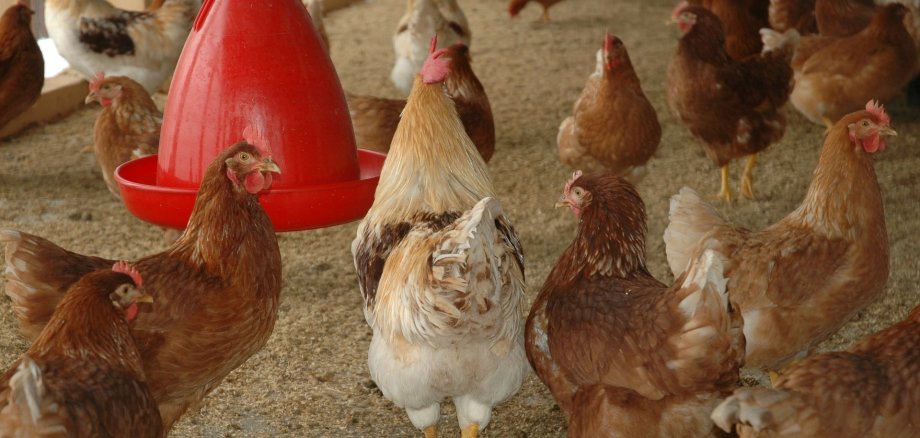Bird flu: County orders increased security measures
After animals in two poultry farms in Waldeck-Frankenberg tested positive for the bird flu virus and subsequently all 130 animals had to be euthanised, the district has issued a general order to protect the bird and poultry population in Waldeck-Frankenberg. The order comes into force on 13 December and regulates further protective measures.
A surveillance zone with a radius of ten kilometres and a protection zone with a radius of three kilometres have been drawn around the farm in Schmittlotheim. Within the surveillance zone, the detailed provisions of the general decree apply to keepers as of tomorrow - among other things: They must declare the number of their animals to the district and report if they fall ill or die. Any symptoms of disease must also be reported. Furthermore, they are obliged to implement increased biosecurity and hygiene measures and to keep records of which persons enter the stables and when. Stricter regulations also apply to the disposal of dead animals and the transport of animals and products in this area. Likewise, no animals or products from poultry may be brought into or out of the surveillance zone without notifying the Food Control, Animal Welfare and Veterinary Service. In addition, it is recommended that animals be kept indoors in the surveillance zone.
In the protection zone in the even narrower three-kilometre radius, further regulations apply in addition to the provisions in the surveillance zone - including, for example, compulsory stabling for the animals and ensuring that domestic poultry may not come into contact with other flocks or wild birds under any circumstances. In addition, tightened biosecurity and hygiene measures apply here once again to prevent the spread of the disease as far as possible. "Basically, we call on all keepers of birds and poultry to take a detailed look at the provisions of the general decree in order to determine which exact regulations apply to their own keeping," says the head of the Food Monitoring, Animal Welfare and Veterinary Service, Dr Anke Zwolinski. If you have any questions, the service is also available as a contact for all keepers at Tel. 06451 - 743 753.
Around the affected farm in Haubern, the district was able to dispense with a general order in this form, since according to EU law, restrictions of this kind may be dispensed with after an outbreak in a private micro-herd, as was the case there. However, poultry keepers in the area are also advised to keep a close eye on their animals and to be particularly vigilant for symptoms of disease.
Cases such as the current ones in Waldeck-Frankenberg or in the autumn in the district of Gießen, where 8,500 animals had to be killed, show that bird flu is again present throughout Germany this year and poses a serious threat to the bird and poultry population. In addition to the risk of infection at poultry shows, as has most likely happened with the current cases, infected wild birds in particular pose an increased risk of infection. In order to minimise the risk of outbreaks in poultry flocks, the district's Food Control, Animal Welfare and Veterinary Department therefore once again appeals to all poultry keepers throughout the district to strictly adhere to the biosecurity measures in place to protect against the introduction of the virus - and to optimise them if necessary. In addition, all poultry keepers who have failed to do so so far should register immediately with the Food Control, Animal Welfare and Veterinary Department - regardless of how many animals they own. They must also be registered with the Hessische Tierseuchenkasse.
Background
Avian influenza is a severe form of avian influenza (AI) in poultry and other birds. The highly contagious virus is very easily transmitted, so it can spread quickly over large areas. Sick animals excrete the pathogen with their faeces, mucus or fluids from their beaks and eyes. In direct contact, other animals become infected by inhaling or picking up virus-containing material. Furthermore, transmission can also occur through contaminated objects such as vehicles, equipment, shoe soles or packaging material. So far, avian influenza cannot be treated.
According to the Robert Koch Institute, there are no known human cases of AI viruses in Germany. Nevertheless, as with all other dead animals, contact with sick or dead wild birds should be avoided and their discovery reported to the district so that they can be recovered and examined as quickly as possible. Dead animals from your own flock should also be stored in such a way that other animals have no contact with the carcasses until they are collected by the rendering service. If several animals of your own herd fall ill or die, this must also be reported to the district.
